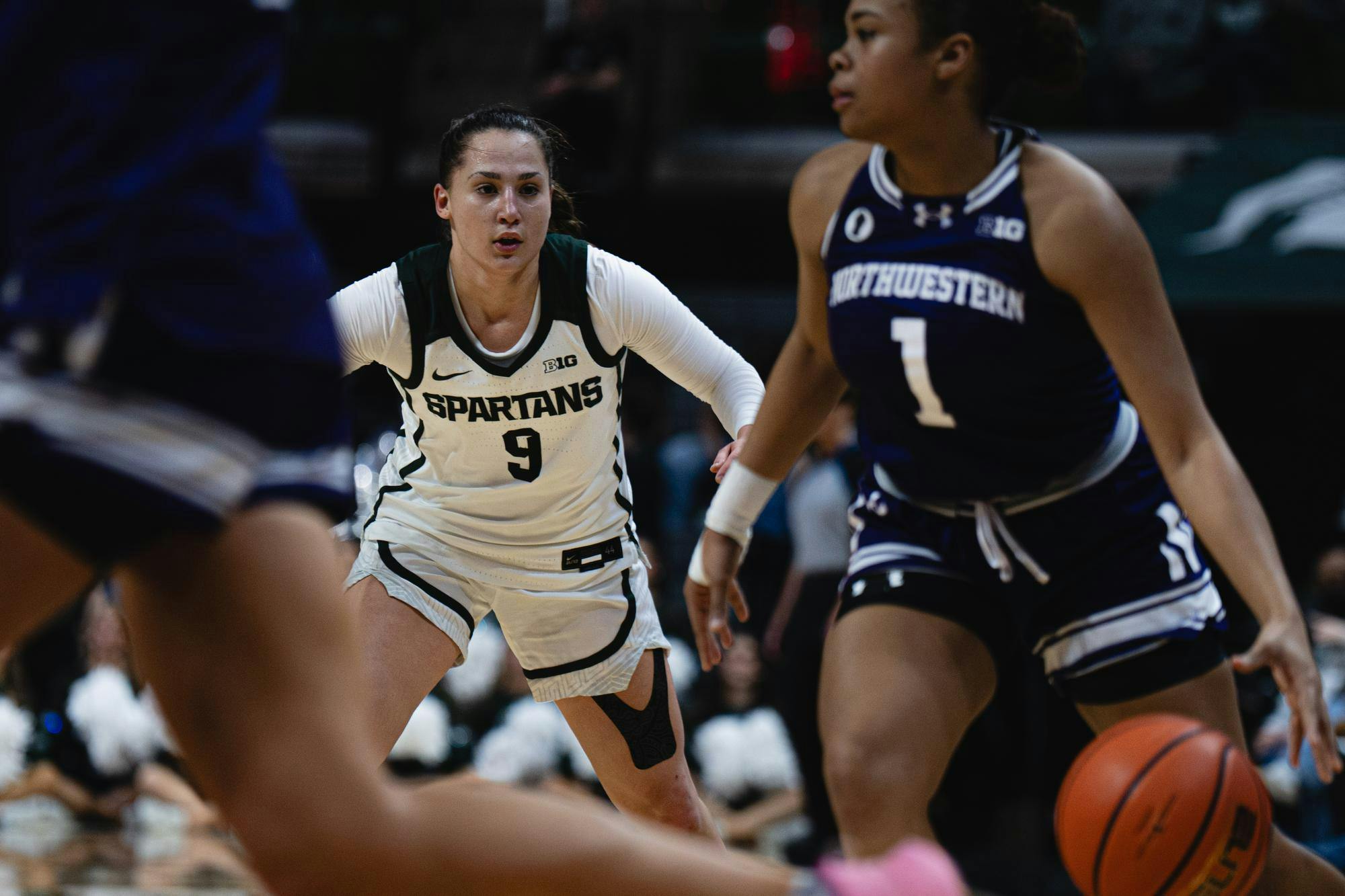A year into contentious debates about endowment holdings tied to Israel, Michigan State University’s board has opted to create a bureaucratic process by which activists can voice concerns about the portfolio.
In a unanimous vote, the board committed to establish a presidentially appointed committee of students, staff and faculty who will be permitted to formally consider "non-financial" concerns over particular investments.
The committee’s findings will then be presented to the president, who can then choose to share them with the board, the ultimate arbiter of the endowment, according to the resolution passed Friday.
Trustee and chair of the board’s budget and finance committee Sandy Pierce touted the move as building "on prior commitments to inclusive dialogue with diverse groups of people." Board chair Dan Kelly described the new "formalized process" for hearing investment concerns as a "step forward," and an upgrade from primarily hearing investment concerns during public comments at board meetings where a "back and forth" conversation isn’t possible.
"It’s a better opportunity for us to evaluate any (investment or divestment) request, whether it be what’s in front of us right now or in the future," Kelly said.
But the action — which follows months of back and forth between student activists and university leadership — was chided by divestment advocates during public comments at Friday’s meeting as a "half baked attempt" at placating students, "disguised as a huge step forward."
During his public comment, student activist David Hogan appeared to cast doubt that the new formalized process will pave the way for the university to divest.
"The committee has essentially been established as an ad hoc committee, something famously known as the place where change goes to die," Hogan said.
Campus debates around Israel’s war on Gaza have proved especially challenging for college leaders. Some violent crackdowns on pro-Palestinian protests have prompted uproars from students and votes of no confidence from faculty. Elsewhere, a perceived apathy to antisemitic rhetoric from protesters ended with the grilling of some prominent presidents before an inflamed congressional subcommittee, prompting dramatic resignations.
MSU, however, has remained largely above the fray. President Kevin Guskiewicz has been praised for his direct engagement with activists and ability to cut deals that ended protests. The university’s infamously embattled Board of Trustees has also shown an uncharacteristic discipline amid the divestment debate, falling behind a united stance despite previous disagreement.
The proposed committee could represent an extension of that dynamic, with its creation of a formal process by which activists can have their demands heard. But it could also prompt the breakage of the delicate balance MSU’s leaders have struck, with activists telling The State News they’re unhappy with the proposal and eager to escalate disruptions.
"I want to be very clear that this is not a win," said student activist Jesse Estrada White in an interview with The State News. "This is solely a way for the university to try and institutionalize our movement, and subvert our demands under them, so that they are free of the nuisance of us continuing to push for divestment."
Estrada White also raised concerns about how the committee will be appointed, saying he would "not be surprised" if Guskiewicz altogether left out people from the Hurriya Coalition, a group of over 20 campus organizations in support of divestment.
Asked if he would appoint people in support of divestment, Guskiewicz told The State News, "I’m going to take input and nominations from, as I said, the various groups, and then we’ll constitute a committee."
"Viewpoint diversity is important to me as I’ve said many times."
Board comes together
The vote on the committee is one action amid a broader unification of MSU’s notoriously embattled board, with the previously divided trustees presenting a seemingly strong alignment on the divestment issue.
Before Guskiewicz took office in March, organizers had a sense of where board members stood on the divestment questions, and where they differed from each other, according to Estrada White.
That strife wasn’t unusual. MSU’s board has become infamous in recent years for its division and dysfunction, due in no small part to a vitriolic bout of infighting last fall that resulted in two members being referred to the governor for potential removal from office.
And it was those two members, Trustees Rema Vassar and Dennis Denno, who seemed somewhat open to the divestment advocates’ demands in private meetings, Estrada White said.
Support student media! Please consider donating to The State News and help fund the future of journalism.
Though the receptiveness from the trustees was a cause for optimism among organizers, Estrada White said some were suspicious that the trustees’ highest priority was scoring political points amid their row with other board members, rather than actually answering the students’ demands.
"There was this undercurrent of their own political battles with the rest of the board," Estrada White said. "They almost felt as if they wanted to get us on their side so they could ride this wave of criticism that was being hurled at them."
But the organizers noticed a shift among the board to a more united front after Guskiewicz took the helm of the university in March.
That coalescence would seem to align with Guskiewicz’s goals for MSU: Following years of turbulence in the university’s leadership and mistrust between the board and administration, Guskiewicz aimed to be a sort of stabilizing force for the university.
In fact, Guskiewicz said in a letter to faculty before taking the job at MSU that he would only do so if the board vowed not to interfere in his administration as it had in the two previous ones. The board accepted, signing pledges not to interfere after Guskiewicz was announced as the university’s next president.
Now, Estrada White said, "there’s this whole rhetoric that Guskiewicz has created, that (the board and administration) are on one team, and they’re going to work together and not take different public positions."
Trustee Brianna Scott’s commitment to that unity, particularly on the divestment issue, was on display during comments she made to student organizers during their sit-in protest at the Hannah Administration building following an Oct. 25 board meeting.
In a video of the exchange posted on the Hurriya Coalition’s Instagram page, Scott said to divestment advocates, "what you’re asking me is to take a side, and we do have a policy of neutrality, and I’m not going to go against what that policy stands for."
"I’m not in a position today to sit here and tell you that I’m willing to say that I support divestment."
For student activist Ateeyah Abdul-Wasi, Scott’s comments were frustrating, given that she’s previously expressed to divestment advocates that she "can empathize" with their cause.
"She’s tried to liken our efforts to what happened during the Civil Rights Movement, saying, 'If I was a student, I’d be right there with you,'" Abdul-Wasi said. "The key factor is that you’re not a student, and that’s why we need you. Because you’re in these rooms, you are a decision-maker, you are somebody who holds immense power in this university.
"For you to sacrifice that for a position of neutrality because you think that’s what upholds your position as a board member and makes you a good board member — is false."
Other trustees have also stayed in line against divestment, the student organizers said.
In meetings with divestment advocates, just-appointed board chair Kelly Tebay has demonstrated "an unclear understanding of how the investment process works," Estrada White said. While Pierce more fully understood the university’s investments, she was "openly against" divestment.
In spite of the board’s seemingly united front, Estrada White said Denno has remained "semi-supportive" of the divestment cause, but declined to provide details on the nature of any conversations with him.
In a recording of a January meeting with students that was obtained by The State News, Denno expressed support for the divestment cause, but said he couldn’t come out publicly in support of it because he would be "pigeonholed as the pro-Palestinian, anti-Israeli trustee," and become "completely ineffective."
How divestment demands developed
The divestment debate at MSU began in late 2023, two months after Israel’s response to the Oct. 7 attack galvanized global discussion of the conflict. Student organizers first took to Instagram, posting screenshots of the university’s investment disclosures, which showed holdings tied to weapons manufacturers and an Israeli bond.
At the board’s December 2023 meeting, activists demanded that MSU abandon the investments, arguing they were funding Israel’s war. The students watched the virtual meeting from a campus conference room with two board members who seemed to support their cause.
In the months that followed, MSU attempted to distance the holdings from the current conflict and argued that demands for divestment failed to consider the complexity of the endowment. University financial administrators told The State News that a web of contracts and outside asset managers prevented them from meeting students’ demands, even if they wanted to.
At its February meeting, the board did eventually agree to conduct a "review" of the investments, with the board’s chair asking members of its finance committee to discuss the controversial holdings.
Amid that consideration, MSU’s undergraduate student government passed a resolution supportive of divestment while the Faculty Senate voted down a similar endorsement.
At the board’s next meeting, in April, Pierce, the budget and finance committee chair, presented the findings of the review, saying the board would not consider divestment.
"Divestment would conflict with stewarding the institution's financial health, would increase investment risks, limit returns and jeopardize the assurance their resources will continue to be available now and for future generations," she said.
The students' demands, however, persisted amid a national surge of advocacy.
Weeks after Pierce presented the board’s stance, activists set up a "Gaza solidarity encampment" in the area behind Wells Hall. The collection of tents and tables was part of a trend sweeping campuses, though scenes elsewhere took a much grimmer turn than those at MSU.
At other universities, encampments led to clashes. Citing antisemitic rhetoric and policy violations, some college leaders asked police to clear the camps and arrest participants. Grisly images spread quickly, with baton-wielding cops on horseback in Texas, violence between activists and counter-protesters in California, and buses full of arrested students in New York. The administrators behind the harshest crackdowns were condemned by some, with a wave of no-confidence votes from faculty unsupportive of the suppression.
At MSU, however, the board granted activists a permit allowing the encampment, which only lasted a few days; counter-protesters were few and largely ignored by those in the camp.
Guskiewicz and other senior administrators visited the camp and spoke with the students. His discussion with activists was largely calm, and he voiced an openness to have a formal meeting with them soon.
The move garnered some respect for MSU’s new president. Amid the ugly scenes across the country, he was one of few to manage peacefully talking to his students, according to glowing national media coverage of his handling of the encampment.
Asked about Guskiewicz’s handling of the encampment this week, Estrada White, the student organizer, said he thought the praise was overblown.
"It was bulls—," he said.
Showing up instead of calling the police was easy, Estrada White argued, and seemed disproportionately tender because of the more aggressive precedent set by other leaders.
"That’s whack," said Abdul-Wasi of the praise for Guskiewicz. "It’s his duty to meet with his students and community."
They said the real issue, and the one people should watch, is what happened inside the meetings between activists and Guskiewicz’s administration in the months that followed his appearance at their encampment.
Line in the sand
After the encampment, Guskiewicz arranged a meeting with student organizers. He also included two administrators: Vice President and Chief Diversity Officer Jabbar Bennett and Assistant Vice President of Student Life and Engagement for Diversity, Equity, Inclusion and Belonging Genyne Royal.
The activists thought the meeting would include discussion of their central demand of divestment, Estrada White said. But it wasn’t on the table, with the meeting instead focusing on ways the administration can support Middle Eastern and North African students on campus through its academic accommodations and its DEI office.
That inspired the activists’ next move: disruptive chants that prompted the evacuation of the board’s June meeting.
The protesters talked to Guskiewicz, who wanted to resume the meeting, Estrada White said. They put forward a deal: Have another meeting with us where divestment is actually discussed, and we’ll allow the meeting to continue. Otherwise, MSU would have to arrest the students, Estrada White said.
Guskiewicz took the offer, and the board’s meeting continued. They scheduled a time for activists to sit down with him, along with Pierce, the finance chair, and investments adviser Phil Zecher.
That meeting yielded similar results as the first, Estrada White said. In his retelling, Pierce declined to speak, saying she was "not there to weigh in on anything," and Zecher attempted to kill time with a lengthy technical explanation of various types of bonds.
Estrada White said one thing was made clear in the meeting: Divestment was not being considered.
That prompted another escalation. After the board’s October meeting, activists staged a sit-in in the lobby of Guskiewicz’s office.
"We said to put divestment back on the table and we’ll leave," Estrada White said.
No such agreement was made, and the protesters didn’t leave. Eventually, MSU police arrested the organizers, including Estrada White.
With that, organizers believe they found the line in the sand, and are looking to change their tactics, Estrada White said. They are hesitant to again end a protest at the promise of a meeting.
The current back-and-forth has left some students "burnt out."
"The university’s strategy, to some extent — it works," Estrada White said.
Administration reporter Theo Scheer contributed reporting.


